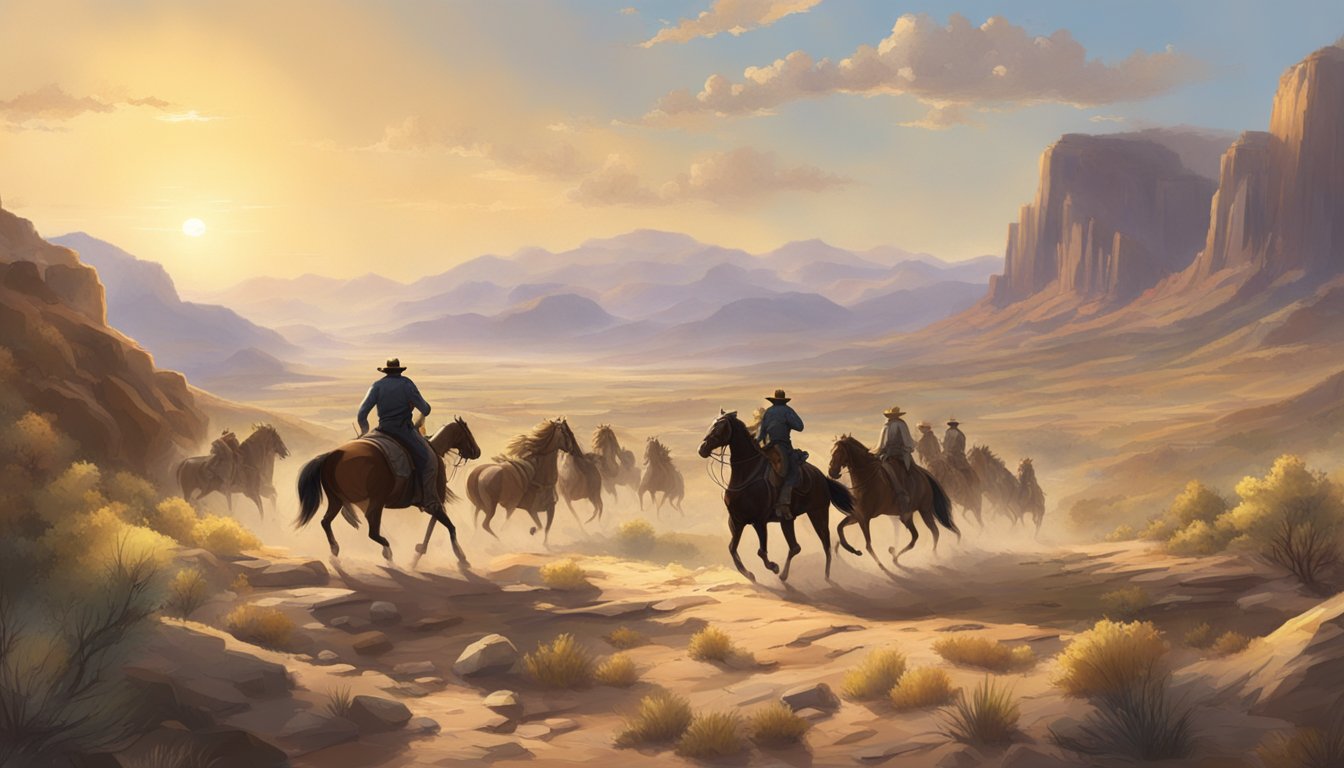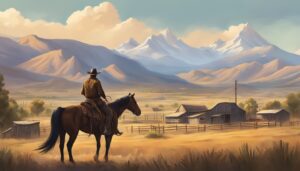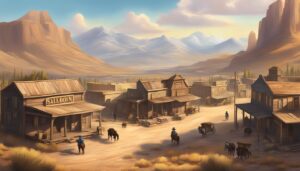Western TV fans face a tough choice between two standout series: Yellowstone and Justified. Both shows have captivated audiences with their gritty portrayals of life in the modern American West.
Yellowstone, created by Taylor Sheridan, follows the Dutton family as they fight to protect their vast Montana ranch. The show blends traditional Western elements with contemporary issues, creating a unique and compelling narrative. While Yellowstone offers stunning visuals and intense family drama, Justified brings a different flavor to the Western genre.
Justified, based on Elmore Leonard’s work, centers on U.S. Marshal Raylan Givens as he enforces the law in rural Kentucky. The series combines sharp wit, complex characters, and thrilling gunfights to create a neo-Western unlike any other. Both shows excel in their own ways, making it difficult to declare a clear winner in this Western showdown.
Historical and Cultural Context of Westerns
Westerns have been a staple of American entertainment for over a century, evolving from literature to film and television. The genre has shaped cultural perceptions of the American frontier and continues to influence modern storytelling.
The Evolution of Westerns
Westerns emerged in the late 19th century as dime novels and pulp fiction. They gained popularity in early cinema, with silent films like “The Great Train Robbery” (1903) setting the stage. The 1930s to 1960s saw the genre’s golden age in Hollywood, featuring iconic actors like John Wayne and Clint Eastwood.
Television embraced Westerns in the 1950s and 1960s with shows like “Gunsmoke” and “Bonanza.” These series often romanticized the Old West, emphasizing heroic cowboys and lawmen.
The 1970s brought a shift towards more complex narratives and morally ambiguous characters. This trend continued into the 21st century with shows like “Deadwood” on HBO, which presented a grittier, more historically accurate portrayal of the frontier.
Influence of Westerns on Modern TV
Contemporary television has seen a resurgence of Western-inspired content, adapted for modern audiences. Shows like “Justified” and “Yellowstone” blend traditional Western elements with current themes and settings.
Streaming platforms like Netflix have contributed to this revival, producing Western-themed series that appeal to a global audience. These shows often explore complex social issues, moving beyond simple good-versus-evil narratives.
The influence of Westerns extends beyond the genre itself. Many popular TV dramas borrow storytelling techniques and themes from Westerns, such as the exploration of frontier-like settings or the struggle between order and chaos.
Modern Westerns on TV also reflect changing societal values, featuring more diverse casts and addressing historical inaccuracies of earlier iterations. This evolution has helped the genre remain relevant and attract new generations of viewers.
Overview of Yellowstone
Yellowstone, a critically acclaimed modern Western drama, has captivated audiences with its gripping portrayal of the Dutton family’s struggles to maintain control of their vast ranch. The show blends family drama with intense conflicts over land and power in the rugged landscape of Montana.
Creation by Taylor Sheridan
Taylor Sheridan, known for his neo-Western screenplays, created Yellowstone as a gritty exploration of modern ranching life. Sheridan’s vision brings authenticity to the series, drawing from his own experiences growing up on a ranch in Texas. His unique perspective blends traditional Western themes with contemporary issues, creating a fresh take on the genre.
Sheridan’s involvement extends beyond creation, as he serves as writer, director, and executive producer. This hands-on approach ensures the show maintains its distinctive voice and style throughout its run.
Story and Setting
Set in Montana’s picturesque Yellowstone region, the series revolves around the Dutton family’s fight to protect their ancestral ranch. The sprawling Yellowstone Dutton Ranch, the largest contiguous ranch in the United States, serves as the central backdrop for the unfolding drama.
The show explores complex themes such as:
- Land rights and development
- Native American relations
- Political corruption
- Family legacy
These elements intertwine to create a rich, multifaceted narrative that reflects real-world tensions in the American West.
Cast and Characters
At the heart of Yellowstone is the Dutton family, led by the patriarch John Dutton, portrayed by Kevin Costner. Costner’s commanding presence anchors the series, bringing gravitas to the role of a powerful rancher fighting to preserve his way of life.
Key characters include:
- Beth Dutton (Kelly Reilly): John’s fiercely loyal daughter
- Kayce Dutton (Luke Grimes): John’s son, torn between family loyalty and his Native American wife
- Jamie Dutton (Wes Bentley): The adopted son and aspiring politician
- Rip Wheeler (Cole Hauser): The ranch foreman and Beth’s love interest
The ensemble cast brings depth and complexity to their roles, creating a tapestry of compelling characters whose relationships and conflicts drive the series forward.
Overview of Justified
Justified is a critically acclaimed crime drama series that brings the Western genre into a modern setting. The show follows U.S. Marshal Raylan Givens as he enforces the law in rural Kentucky.
Based on Elmore Leonard’s Works
Justified draws inspiration from Elmore Leonard’s novels and short stories, particularly “Fire in the Hole.” Leonard’s distinctive style of sharp dialogue and morally complex characters shines through in the series. The show’s creators worked closely with Leonard to capture his vision.
The author’s influence is evident in the witty exchanges between characters and the nuanced portrayal of criminals and lawmen alike. Leonard’s blend of humor and gritty realism sets Justified apart from typical police procedurals.
Story and Setting
Set in Harlan County, Kentucky, Justified explores the tensions between law enforcement and the local criminal underworld. The series delves into themes of family, loyalty, and the struggle for power in a economically depressed region.
Raylan Givens returns to his hometown, confronting his past while tackling present-day crimes. The show balances episodic cases with overarching storylines, creating a rich, interconnected narrative.
Harlan County itself becomes a character, with its coal mining history and Appalachian culture playing crucial roles in the plot.
Cast and Characters
Timothy Olyphant leads the cast as Raylan Givens, a quick-witted and trigger-happy U.S. Marshal. Olyphant’s charismatic performance brings depth to Raylan’s complex moral code and troubled past.
The supporting cast includes Walton Goggins as Boyd Crowder, Raylan’s childhood friend turned criminal nemesis. Their cat-and-mouse dynamic forms the heart of the series.
Other notable characters:
- Ava Crowder (Joelle Carter)
- Art Mullen (Nick Searcy)
- Tim Gutterson (Jacob Pitts)
- Rachel Brooks (Erica Tazel)
Each character brings a unique perspective to the show’s exploration of justice and morality in the modern American South.
Comparative Analysis

Yellowstone and Justified stand out as two of the most acclaimed modern Western TV series. Both shows have garnered praise for their storytelling, performances, and visual style, while exploring themes of crime and justice in frontier settings.
Critical Reception and Awards
Justified received widespread critical acclaim throughout its six-season run. The series earned eight Primetime Emmy nominations, with Margo Martindale winning for Outstanding Supporting Actress. Timothy Olyphant’s portrayal of Raylan Givens earned him an Emmy nomination and a Critics’ Choice Television Award.
Yellowstone has become a ratings juggernaut for Paramount Network. While initially receiving mixed reviews, later seasons have garnered more positive critical reception. The show has earned SAG Award nominations for its ensemble cast and a Golden Globe nomination for Kevin Costner’s lead performance.
Cinematography and Direction
Justified’s visual style captures the gritty essence of Kentucky coal country. The show employs a muted color palette and handheld camera work to create an authentic, lived-in atmosphere. Directors like Adam Arkin and Jon Avnet brought a cinematic quality to the series.
Yellowstone showcases the sweeping vistas of Montana with stunning cinematography. The show utilizes wide shots to emphasize the rugged landscape. Director Taylor Sheridan’s background in filmmaking lends a cinematic scope to the series, with carefully composed shots and dynamic camera movements.
Narrative and Writing
Justified’s writing is praised for its sharp dialogue and complex character relationships. The series balances serialized storytelling with case-of-the-week elements, exploring themes of loyalty, family, and the cyclical nature of crime. The dynamic between Raylan Givens and Boyd Crowder forms the backbone of the narrative.
Yellowstone focuses on multi-generational family drama and power struggles. The show delves into themes of land ownership, Native American rights, and the clash between old and new ways of life. Its sprawling narrative weaves together multiple storylines, examining the Dutton family’s efforts to maintain control of their vast ranch.
Cultural Impact and Legacy

Yellowstone and Justified have left significant marks on television and popular culture. Both series revitalized the Western genre for modern audiences, attracting devoted fan bases and influencing subsequent productions.
Fan Base and Viewership
Yellowstone boasts impressive viewership numbers, consistently drawing millions of viewers per episode. The show’s popularity has led to a surge in Western-inspired fashion and increased tourism to filming locations. Justified, while not matching Yellowstone’s ratings, cultivated a dedicated following praised for its clever dialogue and complex characters.
Fan engagement for both series extends beyond the screen, with active online communities discussing plot developments and character arcs. Yellowstone’s popularity has spawned multiple spin-offs, including 1883 and 1923, expanding its universe and further cementing its cultural impact.
Influence on Other Series
Yellowstone’s success has sparked a renaissance in Western-themed television. Its blend of stunning visuals, family drama, and high-stakes conflicts has set a new standard for the genre. Shows like Godless and Hell on Wheels have benefited from the renewed interest in Western narratives.
Justified’s impact is evident in the rise of crime dramas set in rural America. Its portrayal of complex law enforcement figures and local criminals has influenced series like Longmire. Both Yellowstone and Justified have demonstrated the enduring appeal of Western themes when adapted for contemporary audiences.
Streaming and Accessibility
Both Yellowstone and Justified have found success through streaming platforms, expanding their reach beyond traditional cable audiences. Their availability on various services has played a significant role in growing their fanbases.
Availability on Streaming Services
Yellowstone streams exclusively on Paramount+, the streaming service from ViacomCBS. New episodes appear on the platform shortly after airing on the Paramount Network. Paramount+ offers a 7-day free trial, allowing viewers to sample the show before committing to a subscription.
Justified, originally an FX production, is available on multiple streaming services. Hulu carries all six seasons as part of its standard subscription. The series can also be found on Amazon Prime Video, though it may require an additional purchase or rental fee.
Both shows are accessible through various smart TVs, mobile devices, and gaming consoles, ensuring viewers can watch on their preferred screens.
Impact of Streaming on Viewership
Streaming has significantly boosted viewership for both Yellowstone and Justified. Yellowstone’s audience grew substantially after its addition to Paramount+, with many viewers discovering the show through binge-watching earlier seasons.
Justified has enjoyed a resurgence in popularity thanks to streaming. Its availability on Hulu has introduced the series to new audiences years after its original run ended. This renewed interest has even led to the development of a sequel series.
The flexibility of streaming allows fans to rewatch favorite episodes or catch up on missed content at their convenience, further enhancing engagement with these Western dramas.
Future of Western TV Shows
Western TV shows continue to evolve, blending traditional elements with modern storytelling. New releases and innovative approaches are shaping the genre’s future.
Upcoming Releases and Spin-offs
“Justified: City Primeval” is set to bring U.S. Marshal Raylan Givens back to screens. This limited series revival promises to maintain the gritty tone of its predecessor while exploring new territory.
“Outer Range” combines Western themes with sci-fi elements, pushing the boundaries of the genre. The show’s unique premise has garnered attention and may inspire similar genre-blending projects.
“Dark Winds” offers a fresh perspective on Western storytelling, focusing on Navajo Tribal Police officers. Its success could pave the way for more diverse narratives within the Western genre.
Potential for Genre Innovation
Western TV shows are embracing contemporary issues and diverse perspectives. Shows like “Yellowstone” have proven that modern Western dramas can attract large audiences.
Streaming platforms are investing in Western content, allowing for more experimental approaches. This could lead to shorter, more focused series or anthology formats exploring different aspects of Western life.
Technology may play a larger role in future Western shows, with potential for interactive storytelling or virtual reality experiences set in the Old West.
Crossover potential exists between Westerns and other genres, such as crime dramas or supernatural thrillers. This fusion could attract new viewers and revitalize the Western genre for modern audiences.



